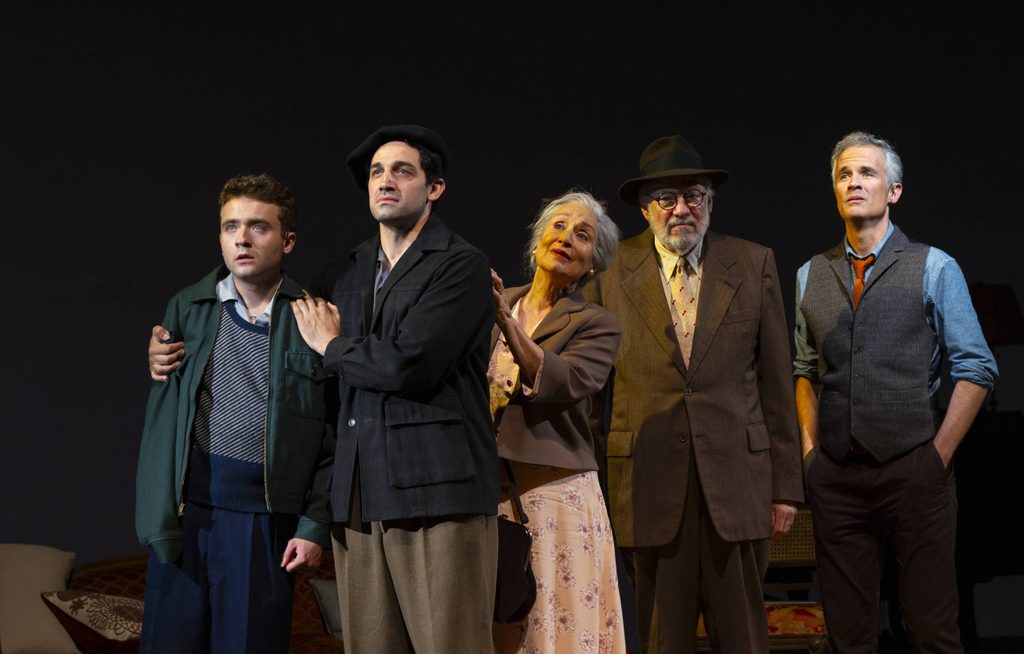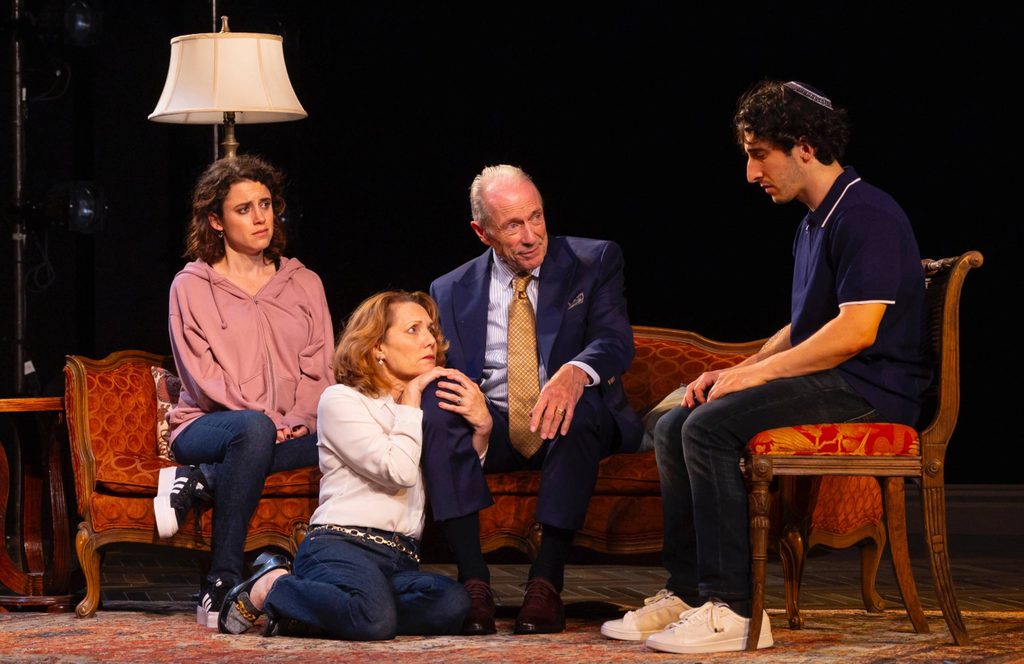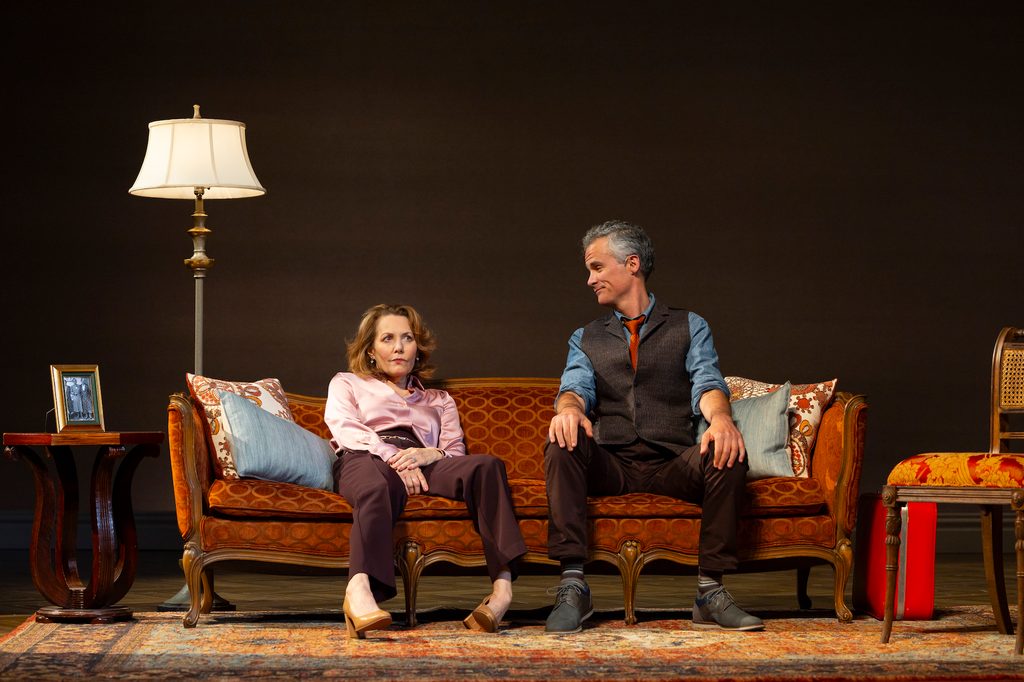
‘Prayer for the French Republic’ – Written by Joshua Harmon. Directed by Loretta Greco. Scenic Design by Andrew Boyce. Costume Design by Alex Jaeger. Lighting Design by Christopher Akerlind. Sound Design and Composition by Fan Zhang. Presented by Huntington Theatre, 264 Huntington Ave., through October 8.
By Shelley A. Sackett
Playwright Joshua Harmon has a gift for tackling important, profoundly challenging and topical subjects and, through sheer brilliance of characters and dialogue, creating intimate and accessible theater that both rivets his audience and leaves them in a standing ovation of thunderous applause.
He did it with “Bad Jews,” “Admissions,” and “Significant Other,” which Boston theatergoers had the good fortune to see at SpeakEasy Stage Company. Thanks to the Huntington Theatre’s season opener, the 2022 Drama Desk Outstanding Play Award-winning “A Prayer for the French Republic,” they have the opportunity to experience this supremely talented writer’s latest and most ambitious project.
And experience it they should.
Under Loretta Greco’s razor-sharp direction, the 11-member cast masterfully brings Harmon’s themes of antisemitism, assimilation, family, freedom, identity and fear — to name a few — to life. Despite its three-hour running time (one intermission), the fast-paced and sharp-witted dialogue makes the time fly by.
Set in Paris in 2016 and 1945, the play follows five generations of Jewish piano sellers. Marcelle Salomon Benhamou, the current matriarch, her husband Charles and their children, Daniel (26) and Elodie (28), are the contemporary members of the original Salomon family. Hers is a complicated and intricate family tree, full of twists and turns and bent and broken branches.

The play opens with house lights up as Patrick (Tony Estrella), the play’s narrator and Marcelle’s brother, addresses the audience. His eye contact and hands-in-trousers-pockets ease establish rapport and immediacy. “What is the beginning of a family?” he asks as he strolls across a set that will represent both 1945 and 2016. “And what,” he doesn’t ask but seems about to, “is its end?”
The calm is broken by a thrust into the Benhamou apartment, where Marcelle (the sublimely talented Amy Resnick) continues Patrick’s train of thought by explaining the family genealogy to a dumbfounded guest, Molly (Talia Sulla), a naïve and distant sort of cousin from America who is spending her junior year abroad in Paris. Molly (like the audience) tries to absorb the details but is thankful when Marcelle repeats the accounting.
Jumping to the present, Marcelle explains that Daniel is their religiously observant son. Daughter Elodie has been struggling with mental health issues and is, well, Elodie. Molly nods in mute agreement.
Just as Molly (and we) sort of get it, Charles (the always amazing Nael Nacer) and Daniel (Joshua Chessin-Yudin) burst through the door. Daniel, who teaches at a Jewish school and wears a kippah (Jewish head covering), has been attacked by a gang of antisemitic thugs. His face is bloody, but he is nonplussed. His parents are apoplectic.
“How many times have I begged you to wear a baseball cap?” Marcelle pleads, comparing his refusal to hide the kippah to painting a target on his back that screams, “Here I Am.” She urges her son to wake up to the danger he invites by advertising his religion in what is France’s current climate, where Holocaust deniers and Nazi sympathizers hold more sway. What she doesn’t do is entertain any thought of fleeing the country where her family of Ashkenazi ancestors has lived for centuries.

Charles’ reaction is different. He has seen this before and knows where it can lead. His North African Sephardic Jewish ancestors have been living in diaspora since they were forced to flee their home in Algeria in the 1960s.
“It’s the suitcase or the coffin,” he says. He has reached his limit. He wants to go “home.” He wants to move to Israel. It may be unsafe there, too, but at least everyone is unsafe, not just Jews.
The family’s real firebrand and deliverer of Harmon’s celebrated monologues and dialectic analyses is Elodie (an electrifying Carly Zien, who steals every scene she’s in). While she may present as disheveled, her lines of logic and fact-based arguments are sources of encyclopedic knowledge and awe. She is not mentally ill so much as she is reacting in an unhinged way to a world that has come unhinged. (Her interaction with Molly at a bar is worth the price of admission and deserving of a standing ovation).
Harmon then quietly relocates us to 1944 (Andrew Boyce’s set accomplishes this seamlessly and with elegant artistry), where we meet Marcelle and Patrick’s great-grandparents, Irma and Adolphe Salomon (Peter Van Wagner and Phyllis Kay, both charming). They sit in their apartment towards the end of World War II, wondering what has happened to the rest of their family. Miraculously, they were able to remain in Paris during the war after the Nazis sent to deport them took pity on their age and left them alone. They have even managed to hold onto their piano store.
“What do people remember when you’re gone?” narrator Patrick asks the audience, pointing to his forebears. He then tells the story (Estrella really shines here) of how Irma would butter Adolphe’s toast first, and then use what was left to butter her own, in order to make it last longer and hide their dire circumstances from Adolphe. Those tiny, very human details are only one example of Harmon’s many playwriting virtuosities.
Writing cutting, funny, fast-paced and well-researched dialogue is another. The words fly at whiplash speed when the action shifts from 1944 back to 2016, where we pick up where we left off. Daniel and Molly are getting to know each other. (“How did you become religious?” she asks. “I prayed and I liked it, so I kept going,” he replies.)

Charles makes his case for leaving France before it’s too late (“I’m scared. Something is happening,” he confesses). Marcelle, quintessentially French and clinging to control, argues that Jews are never safe. Anywhere. At any time. Jew hatred, which in 2016, with the 2015 Charlie Hebdo and kosher deli shootings in Paris, the rise of the ultra-right in Europe and the election of Trump in America, has been regaining a foothold globally, is just the way it is.
“What is history but a bunch of stuff other people tell you to get over,” Patrick asks when later, with calm, cynicism and a touch of sadness, he gives a matter-of-fact account of the centuries of persecution suffered by Jews at the hands of the French, starting in 1096 with the Crusades.
And yet, France was the first country in Europe to offer Jews the full rights of citizenship in the hope that they would stop acting like a separate nation and assimilate, identifying more as French than as Jews. Making the case for staying put, he alludes to the fact that even the Holocaust couldn’t uproot the Salomon French family tree. Nor did it force them to convert (although he chose to marry a Catholic). They can withstand this comparative blip.
“Prayer for the French Republic” addresses many deeply troubling topics. Why are people obsessed with Israel? Is it appropriate for Jews to be scared? Is it irresponsible not to be? Now that Israel’s internal politics have so radically shifted, is even Israel still safe? Is it really “home?” Are we at the same tipping point where we were right before the Holocaust? At what point do we acknowledge that our world has hit an iceberg and, like it or not, our choices are to jump overboard or go down with the mother ship?
For this reviewer, the most telling moment was the play’s end. Would Harmon come down on the side of staying put in France or moving to Israel? As the cast belted out the French national anthem, “La Marseillaise” instead of Israel’s “Hatikva,” we had our answer.
For more information and to buy tickets, visit https://www.huntingtontheatre.org/

